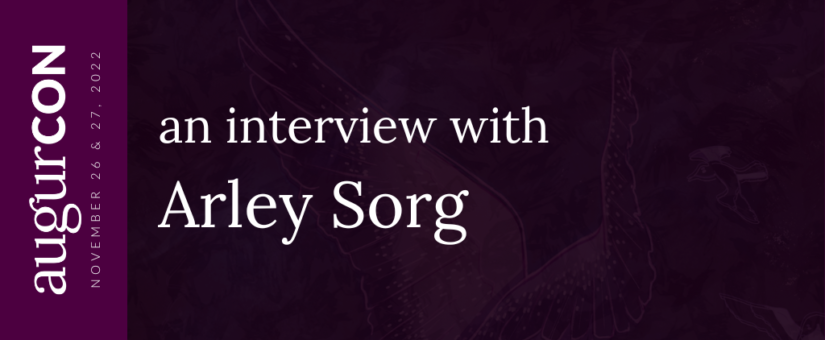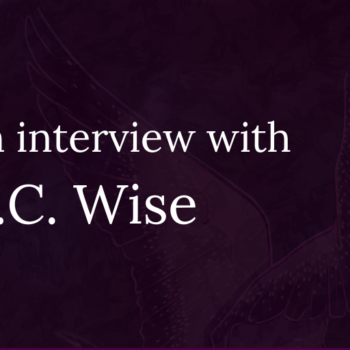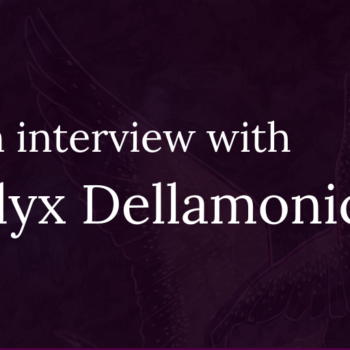
An interview with Arley Sorg #AugurCon2022
- Posted by Augur Blog
- On November 20, 2022
- 0 Comments
- author interview
On November 26 & 27 we’re hosting our second-ever AugurCon, our virtual celebration of speculative literatures! We’re joined by over 45 amazing guests, including authors, poets, editors, and publishing professionals, to explore the intersections of the world we know—and the ones we dare to imagine.
We connected with Arley Sorg, co-Editor-in-Chief at Fantasy Magazine, who is a workshop host at this year’s AugurCon.
Get your ticket to attend his panel:
Quill to Paper: Workshopping Stronger Story Beginnings
Sunday, November 27 at 4–6:00 PM EST / 1–3:00 PM PST
To see the full weekend program schedule, visit our website.
You’re leading the Stronger Story Openings Workshop, which we’re all stoked about. As an editor, what’s the most common flaw you see in story openings?
I think it’s just… not being interesting enough. Many writers believe that what they have to do to sell fiction is write something good. But this is not exactly true. Or I should say, this isn’t exactly enough. If we open Fantasy Magazine to general submissions for a week, we will see over a thousand submissions, and probably half or more of them are “good.” When your critique partners, beta readers, family, friends, and so on, read your story, they are going to read it through to the end, regardless of what you are doing at the beginning; they are also predisposed to feel some certain way because they know you. But when your story comes in at Fantasy or most major venues, if it’s “good”, it is actually one of several hundred which are also “good”—and we can only buy four stories. This means that the opening has to do more than just be “good:” it has to stand out.
The average reading speed (according to a Google search, for what that’s worth) is 250 words/minute, so that’s sixteen minutes for a 4,000 word story, which is 4,800 minutes (80 hours) for 300 stories. Keep in mind that editing is something most of us do for very little or no money and many of us (me and Christie Yant included) work full-time day jobs. We simply can’t spend 80 hours reading each submission beginning to end; keep in mind also that this would be, maybe, just a week’s worth of submissions. So—and granted, each venue is slightly different from the next, from approach to using first readers or not and so on—but most of us who receive a lot of submissions will decide how much farther we will read based on the opening line, the opening paragraph, and the opening page if we get that far.
That opening page has to stand out, it has to do something interesting, or the story doesn’t actually get read. What “interesting” means specifically can vary greatly story to story! Which is what I go into in more detail in the class!
At Augur, we talk a lot about “stories for the futures we need.” We know what it means to us—but what does that mean to you?
For me, the first thing I think of is inclusivity, meaning stories by a greater range of folks than we have historically seen in genre fiction. I think this interpretation arises because I feel like mainstream storytelling modalities, whether television, movies, books, and so on, have for decades largely overlooked or misrepresented many, many kinds of folks, including Black folks, Asians, Muslims, trans folks, and more. Even cis-women have been writing SFF for a long time, but don’t get the mentions and accolades they deserve.
The future I need is one where more kinds of people are seen and respected and celebrated. It shouldn’t matter if you are trans or Muslim or ethnically ambiguous: respect and basic human rights should be a given. But this is not the case—it’s dangerous to be those things, to just exist as those things can put you in physical, mortal harm. Even here in the San Francisco area, which many people think of as a “gay” city, there are gay bashings; and in California, which many think of as very liberal, there are a lot of incidents of violence based on race, sexuality, and other identity-based factors. (One of many reports here.)
It’s not right that gay people, for example, are erased and/or grossly misrepresented, and it’s definitely not right that gay people are physically harmed – sometimes killed – just because they are gay. Genre fiction has a long history of denying so many folks visibility. A great example is the wealth of stories based in Africa written by white people, some of them award nominated or award-winning, contrasted by a long-running reluctance to publish, promote, or even read African authors.
Things are changing! But there’s a long way to go. Give me a half-Black half-Mexican trans-Superman whose storyline isn’t about how hard it is to be a trans hero, but who gets to have a love interest and do all the things that our current always white cis-male hetero Superman does. Give me stories from more perspectives, about more experiences. This is the future I need.
Who do you think is absolutely KILLING it right now in the spec fic genre? Whose work inspires you?
There are a lot of people doing cool things in genre! Alex Brown (aka QueenOfRats on Twitter) has some great reviews at Locus. Of course Augur is awesome and I tell a lot of people about y’all, and you’ve been doing good things for a while.
There are many cases where I’ve read one thing or two things by someone, or an anthology, and really liked it, but I haven’t read their other stuff (even if I’ve seen their name around), so I don’t know if they are killing it or if they just did a really cool thing, which is maybe different (but still awesome). Or—maybe doing one cool thing is actually killing it? Especially when life can be so rough…
Anyways, Sheree Renée Thomas has been killing it for a long time, but she’s been involved with a few recent projects that are important, such as Trouble the Waters co-edited with Pan Morigan and Troy L. Wiggins. Oghenechovwe Donald Ekpeki’s The Year’s Best African Speculative Fiction (2021) is a must-read for anyone who loves short fiction, and will open up a world of authors who are killing it, and who aren’t being celebrated as much as they should be.
I haven’t had time to dig into FIYAH magazine lately, but I’ve read a number of earlier issues, and I feel like they are both important and killing it. I’ll shout out Zig Zag Claybourne, Sabrina Vourvoulias, Patrice Caldwell, L.D. Lewis, Kim Fu, Isabel Yap, Z.K. Abraham, Kelsea Yu, Eliza Chan… okay, I have to stop. This could become a very long reading list, so I’ll leave it at that. Well, of course, anyone in Fantasy Magazine is killing it! *grins*
You do 1,000,001 things per week. How do you manage to juggle so much and still have time to eat and sleep while maintaining a level of quality?
Quality? What… what is this “quality” you speak of? hehe
I think that if you enjoy what you do then there is an inherent quality in your life in doing them. I enjoy editing Fantasy Magazine so, even though it’s something I do in my free time, it doesn’t necessarily feel like I’m “losing” free time. It is work, and it takes up a lot of time, and sometimes I’m exhausted by my day job or whatever else. But Fantasy Magazine is something I value doing. The things that I do in genre are not really the problem. “Real life” is the problem: health issues, challenges with my living situation, and so on—there are a bunch of things, a fairly long list of things to be honest, that have come up over the last couple of years, that have dramatically affected (and continue to seriously impact) both my ability to get things done and my quality of life.
I think for people who would like to be more involved, go ahead, get involved—do alllllll the things! But also check in with yourself from time to time about whether or not you are enjoying something (especially if it doesn’t pay or pays very little); as well as what you are getting out of it. And what you get out of it doesn’t always have to look a certain way. What you get out of it doesn’t even have to be what someone else gets out of it. It just depends on what is important to you in particular.
For example, what I value most about co-editing Fantasy Magazine is 1) being able to contribute to the very shape, nature, and identity of the SFF field; 2) being able to provide a platform for fantastic authors, some of them writing works I personally believe might not be seen in other venues, or writing from experiences that might not be understood by some of the important figures of genre—not for a lack of brilliance on the part of the authors, but for the various biases or perspectives of the field in general. So, it’s not about awards or money or status; it’s about things that are valuable to me, that feel rewarding to me. I think for those of us who do a lot of stuff in genre, being in touch with how you actually feel about something is a big part of doing all the things but also having a quality of life.
Hear more from Arley: Get your ticket to AugurCon 2022
Arley Sorg, co-Editor-in-Chief at Fantasy Magazine, is a 2022 Solstice Award recipient, a 2021 and 2022 World Fantasy Award finalist, a 2022 Locus Award finalist, and a double 2022 Ignyte Award finalist. He is also senior editor at Locus Magazine, associate editor at Lightspeed & Nightmare, a columnist for F&SF, and an interviewer for Clarkesworld. Arley is a 2014 Odyssey Workshop graduate and is the week 5 instructor for the upcoming Clarion West Workshop in 2023. Find him at arleysorg.com or on Twitter @arleysorg.
Join Arley at AugurCon! Our workshop Quill to Paper: Workshopping Stronger Story Beginnings takes place on Sunday, November 27. Get your ticket to AugurCon 2022 now!




0 Comments